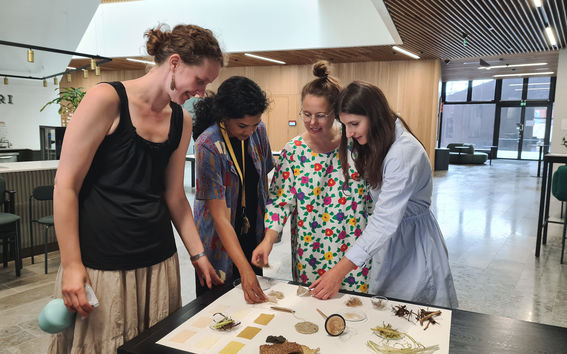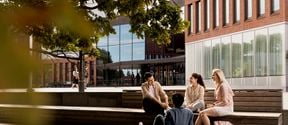Aalto University Summer School
Aalto University Summer School offers high quality academic summer courses and programs at Aalto University.

Natalie Wunder is a 25-year-old project leader working in the New Business Development department at Kelheim Fibres GmbH in Germany. Last summer, Natalie participated in the Nordic Biomaterials course with 34 other students. With a background in a bachelor program focused on innovative textiles and master programs on project management and sustainable textiles at the University of Applied Science in Hof, Natalie worked on developing a sustainable menstruation panty as a part of her thesis and now continues in the same project.
I decided to take the summer school course “Nordic Biomaterials” because I am very interested in different forms of biomaterials and how they can be used to create more sustainable products. My driving force was to broaden my knowledge of cellulosic raw materials and how they can be used to substitute plastics.
I found it great to work with students from different backgrounds and learn about methodologies used in the design world when working with materials. Many experiments with natural materials do not require much equipment, for example, natural dying using plants from the garden. However, in order to implement these techniques in the mainstream textile industry, the mindset of consumers has to change.

I hope that in the future, we use more sustainable materials and consider the end of life when designing a new product. Biomaterials are a great way to create sustainable and, ideally, even biodegradable products that can sometimes substitute plastic materials. Especially in the packaging and textile industry, a lot can be done regarding sustainability using cellulose-based raw materials. I am very curious to see how materials like nanofibrillated cellulose (NFC) and microfibrillated cellulose (MFC) can be used in the future.
The best part of the course was meeting new people from different places and backgrounds and getting inspired by their work and our conversations. It was so interesting to talk to all the students, professors and CHEMARTS staff and to see their projects. These discussions were a great source of inspiration and helped me get many new ideas for future projects.
Nordic Biomaterials is great for students who want to know biomaterials. It offers a lot of time and space to try out different experiments and recipes in the laboratory. It can help if you have a goal or project to work on systematically. You can even bring your own raw materials.
I liked the open atmosphere at Aalto University from the students, professors and CHEMARTS staff. It is also impressive how many student laboratories Aalto University offers, especially in the textile department and how freely students can use them.
After the lectures or lab work, we often went to the Helsinki centre with the metro and visited museums, for example, the national museum of Finland, or did some sightseeing. The highlights were a sauna visit in Helsinki and a day trip to Tallinn in Estonia on the weekend.
The course is ideal for students and people who are already working from different backgrounds as it offers the opportunity to experiment in the laboratory without having any background knowledge about laboratory work. Furthermore, as the Chemarts Cookbook provides a great range of trials, summer school is ideal for getting inspiration and new ideas for projects in the workplace or a starting point to find a topic for a Bachelor’s or Master’s thesis.
The application period for the summer courses in 2023, Nordic Biomaterials included, starts February 1st 2023.

Aalto University Summer School offers high quality academic summer courses and programs at Aalto University.

Inspiration for Material Enthusiasts



